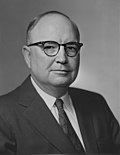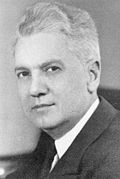| | |||||||||||||||||
| |||||||||||||||||
| |||||||||||||||||
 County results Eastland: 50-60% 60-70% 70-80% 80-90% >90% Doxey: 50-60% 60-70% 70-80% 80-90% Tie: 50% | |||||||||||||||||
| |||||||||||||||||
| Elections in Mississippi |
|---|
 |
The 1942 United States Senate election in Mississippi was held on November 3, 1942. Incumbent Democratic U.S. Senator Wall Doxey, who had won a special election the year prior to complete the unexpired term of Pat Harrison, ran for a full term in office. He was defeated by James Eastland who was appointed to and held the seat prior to Doxey's wins.
Contents
Because Eastland faced no opposition in the general election, his victory in the September 15 primary was tantamount to election.

